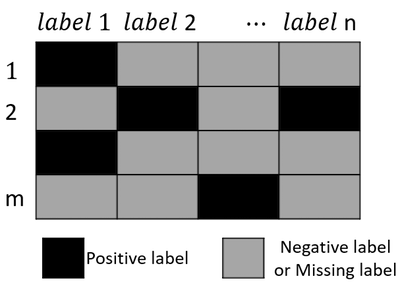Maximal Correlation Embedding Network for Multilabel Learning with Missing Labels

Multilabel learning, the problem of mapping each data instance to a subset of labels, appears frequently in many real-world applications. However, obtaining complete label annotation for every instance requires tremendous efforts, especially when the label set is large. As a result, multilabel learning with missing labels remains as a common challenge. Existing works either cannot handle missing labels or lack nonlinear expressiveness and scalability to large label set. In this paper, we present a novel end-to-end solution for multilabel learning with missing labels. Our algorithm, Maximal Correlation Embedding Network learns a low dimensional label embedding using an encoder-decoder architecture. It exploits label similarity through a maximal correlation regularization in the embedded label space to reduce the classification bias due to missing labels. A series of experiments on popular multilabel datasets demonstrate that our approach outperforms state of the art, both in complete data and partially observed data.
Publication
Conference Paper
| Lu Li, Yang Li, Xiangxiang Xu, Shao-Lun Huang, and Lin Zhang, Maximal Correlation Embedding Network for Multilabel Learning with Missing Labels, 2019 IEEE International Conference on Multimedia and Expo (ICME), 2019 | ppt |
@inproceedings{li2019maximal,
title={Maximal Correlation Embedding Network for Multilabel Learning with Missing Labels},
author={Li, Lu and Li, Yang and Xu, Xiangxiang and Huang, Shao-Lun and Zhang, Lin},
booktitle={2019 IEEE International Conference on Multimedia and Expo (ICME)},
pages={393--398},
year={2019},
organization={IEEE}
}
Poster Abstract
We applied the maximal correlation embedding method to real-time human context recognition with missing labels.
| Lu Li, Yang Li, Xiangxiang Xu, Lin Zhang, A Maximal Correlation Embedding Method for Multilabel Human Context Recognition, 18th ACM/IEEE Conference on Information Processing in Sensor Networks (IPSN’19), Montreal , Canada, April, 2019 | ppt |
